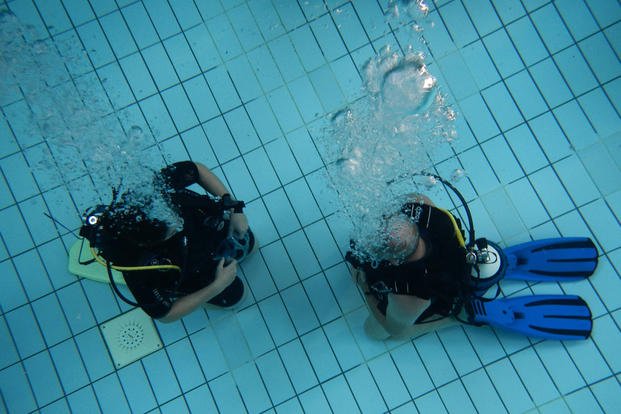Many people learn to clear their ears (and sinuses) when swimming or diving underwater out of necessity. Though this is part of the instruction in a scuba diving course, recreational swimming does not necessarily have people around to help you with the pain caused when going underwater.
When practicing pool skills such as bottom-bouncing, knot-tying or mask retrieval from the bottom of the pool, you must practice relieving the pressure pain in the face and ears. Here is a question about the topic of being underwater for the first time:
Whenever I'm practicing water competency events and at the bottom of the 9-foot pool, I get a sharp pain in the front of my head. Do you happen to know why this happens? Vick
Vick, that's a great question. Yes, the pressure of the water is affecting the body parts with air spaces in them, mainly your sinuses and inner ears. You can learn to clear your ears and rid your forehead pain by learning a simple procedure. If you have difficulty, try it at a shallower section of the pool, and do not force it by trying harder.
I recommend considering a scuba course as part of your preparations for any military special operations or diving course. This course teaches valuable techniques such as the Valsalva maneuver to help you clear your sinuses and ears. Pinching your nose and blowing gently can create pressure in your head, allowing equalized pressure air to enter your sinus cavities and eustachian tubes. This should alleviate the pain you're experiencing.
Do No Blow Hard
The key to doing this without hurting your inner ears and sinuses is to blow gently through your nose while holding your nostrils together with your fingers. You can get too aggressive with this, especially your first few times, and hurt your ears to the point that you cannot swim or dive for at least a few weeks.
If your sinuses are blocked, "clearing your ears" will be even more difficult, but do not try to blow harder; do this instead. Before military dives, if we were fighting colds or had typical seasonal allergies, we would take pseudoephedrine or a nasal spray to help open the sinuses and inner ears.
There are other options, and as you get more comfortable in the water, you can simply swallow or move your jaw from wide open to left/right to clear your ears. These have official titles, and they can be found online, especially on freediving and scuba diving websites such as the Divers Alert Network.
If you are diving for recreation or military purposes, this skill will become second nature and much easier to perform, but for now, practice in the pool and get more comfortable with it. Enjoy the training and progression in the water. You will soon start to see your confidence grow, and your ability to do more swimming, treading, knot-tying, life-saving and drownproofing drills will get easier the more you get in the water and practice.
Final thought: "Remember not to practice until you get it right -- but practice until you cannot get it wrong." That is the level of water confidence needed in many of these military diving and rescue swimmer courses.
Want to Learn More About Military Life?
Whether you're thinking of joining the military, looking for fitness and basic training tips, or keeping up with military life and benefits, Military.com has you covered. Subscribe to Military.com to have military news, updates and resources delivered directly to your inbox.



















